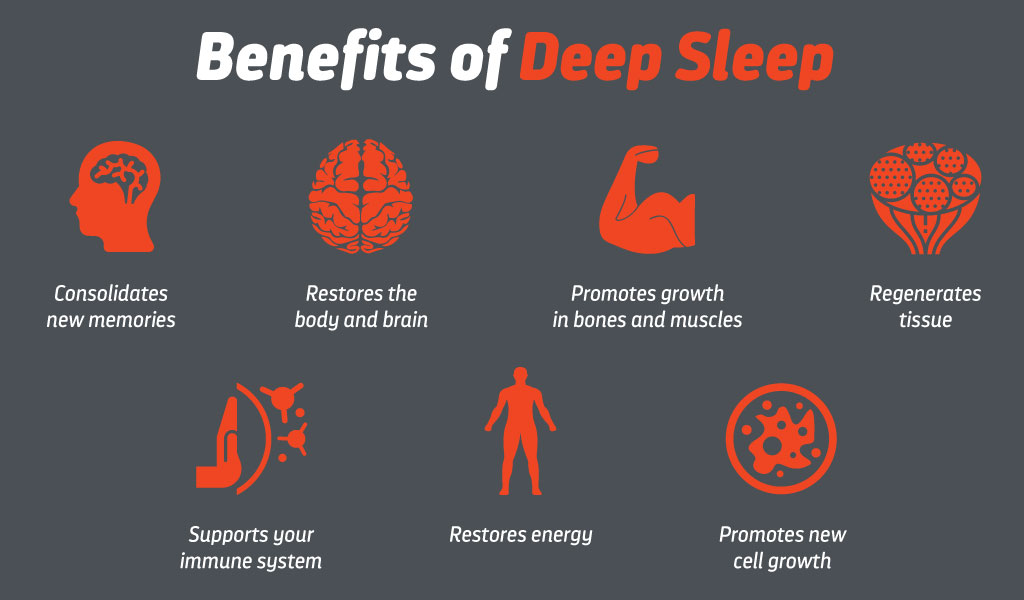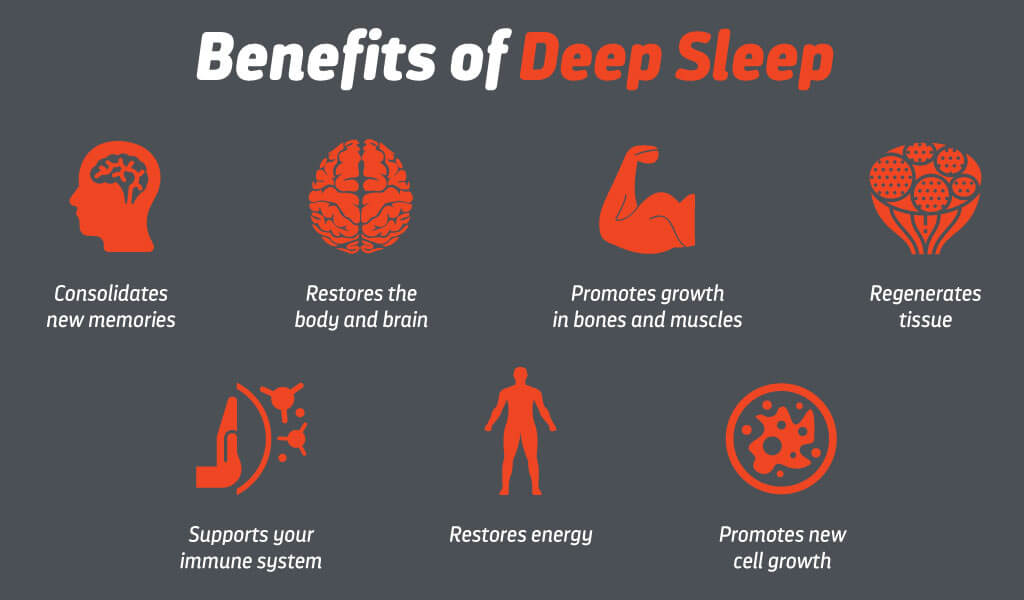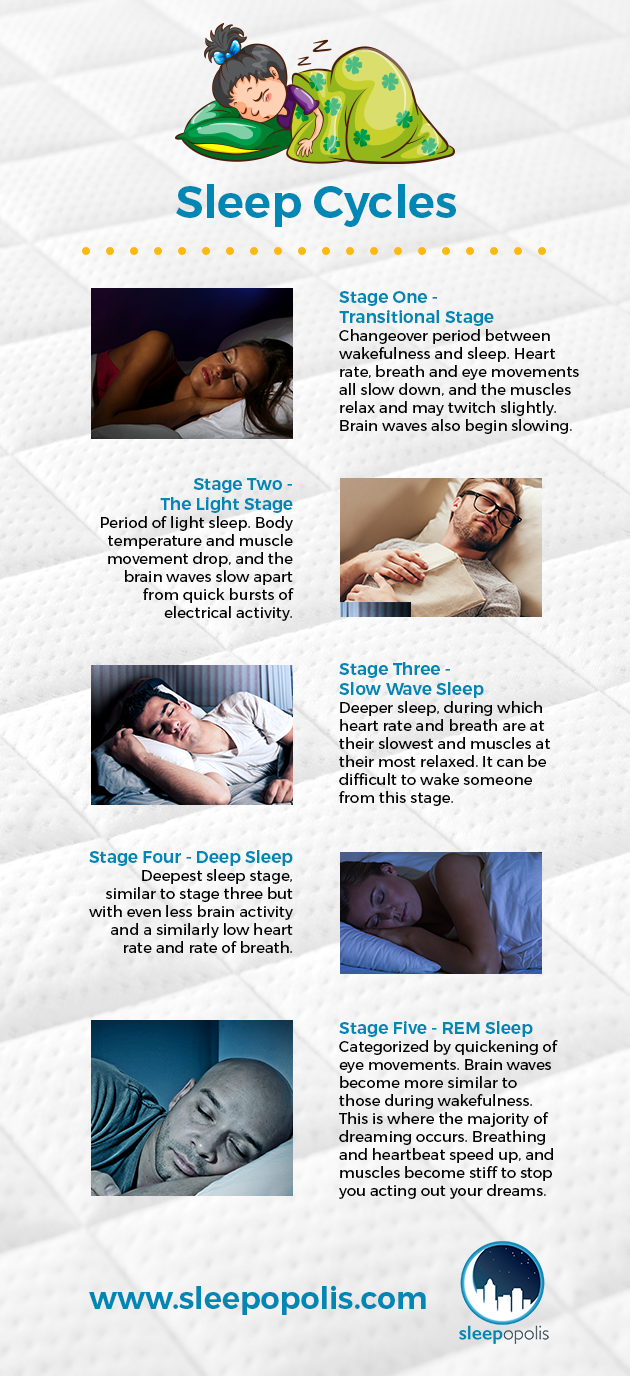Do you find yourself waking up tired, even after a full night’s rest? If so, you might be missing out on the vital benefits of deep sleep.
Deep sleep is more than just a nightly ritual—it’s a cornerstone of your overall health and well-being. It’s the magic phase of sleep where your body repairs, your mind rejuvenates, and your energy is restored. Imagine waking up each morning feeling fully refreshed, ready to tackle the day with clarity and vigor.
Understanding the importance of deep sleep can unlock this potential for you. Stay with us as we delve into why deep sleep is crucial and how you can optimize it for a healthier, more energized life. Don’t let another night pass by without harnessing the full power of deep sleep.
Deep Sleep And Body Repair
Deep sleep plays a crucial role in body repair. It is a restorative phase where the body undergoes essential healing processes. During deep sleep, various biological activities occur that help in repairing tissues, building muscles, and strengthening the immune system.
These processes are vital for maintaining overall health. Understanding the benefits of deep sleep can lead to improved well-being and vitality. Below, we explore how deep sleep aids in cell regeneration, hormonal balance restoration, and immune system strengthening.
Cell Regeneration Benefits
Deep sleep boosts cell regeneration. It helps in repairing damaged cells and tissues. This regeneration is crucial for healing wounds and injuries. New cells replace the old ones, promoting healthier skin and organs. Sleep enhances the body’s natural repair mechanisms. It aids in the recovery from daily wear and tear.
Hormonal Balance Restoration
During deep sleep, hormonal levels stabilize. This balance supports growth and metabolism. Hormones like growth hormone are released in deep sleep. They aid in muscle repair and growth. Balanced hormones improve mood and reduce stress. Sleep helps maintain the body’s hormonal health.
Immune System Strengthening
Deep sleep strengthens the immune system. It increases the production of cytokines. Cytokines fight infections and inflammation. Sleep allows the immune system to function efficiently. It helps protect against illnesses and diseases. A strong immune system is vital for good health.

Credit: laylasleep.com
Mental Health And Deep Sleep
Deep sleep is crucial for maintaining optimal mental health. It plays a vital role in reducing stress, stabilizing emotions, and consolidating memories. This restorative phase of sleep allows the mind to reset and rejuvenate. Understanding its importance can lead to healthier mental wellness.
Stress Reduction
Deep sleep significantly reduces stress levels. During deep sleep, the body decreases cortisol production. Cortisol is the hormone responsible for stress. Lower cortisol levels lead to a calmer mind. A calm mind helps you tackle daily challenges with ease.
Emotional Stability
Emotional stability is enhanced by adequate deep sleep. Sleep helps regulate emotions. It balances mood swings and reduces anxiety. A well-rested mind handles emotions better. Emotional health improves with consistent deep sleep patterns.
Memory Consolidation
Memory consolidation occurs during deep sleep. It strengthens neural connections. Deep sleep aids in processing information and storing memories. This process makes learning more effective. A sharper memory results from good sleep quality.
Deep Sleep And Physical Performance
Deep sleep plays a vital role in enhancing physical performance. It helps repair muscles and restore energy levels, leading to improved endurance and strength. Quality rest during deep sleep is essential for athletes and active individuals to achieve peak performance.
Deep sleep is often underestimated in its role in physical performance. Yet, it’s during this crucial phase of rest that your body does most of its repair and regeneration work. If you’re an athlete or just someone who loves staying active, understanding deep sleep can be your secret weapon.Muscle Recovery
During deep sleep, your body goes into full repair mode. Growth hormone is released, which is essential for muscle recovery. This helps mend tiny tears in muscle fibers caused by exercise, allowing them to grow back stronger. Imagine waking up without that familiar post-workout soreness. That’s deep sleep working its magic. Prioritizing quality sleep can make a noticeable difference in how quickly your muscles recover.Energy Replenishment
Ever felt sluggish after a night of tossing and turning? Deep sleep is when your energy reserves get replenished. It’s like charging your internal batteries overnight. When you don’t get enough deep sleep, you may find yourself reaching for that extra cup of coffee. Instead, aim for a consistent sleep schedule. This can naturally boost your energy levels.Athletic Performance Enhancement
Quality sleep can give you a competitive edge. Studies show that athletes who get enough deep sleep perform better in their sports. Reaction times improve, and so does overall endurance. Think about your last workout or game. Was your performance affected by how well you slept? If so, consider making sleep a priority in your training regimen. You’ll likely see improvements not just in your physical capabilities, but also in your mental focus. Are you willing to prioritize your sleep and see how it transforms your physical performance? The benefits of deep sleep go beyond just feeling rested. They directly impact how you move, recover, and excel in your physical pursuits.Factors Affecting Deep Sleep
Understanding deep sleep is crucial for health and well-being. Stress, poor diet, and irregular sleep schedules can disrupt this vital sleep stage. Creating a calm sleeping environment supports deeper, restorative rest.
Understanding the factors that impact your deep sleep can be a game-changer. The quality of your sleep affects your mood, energy levels, and overall health. By identifying these factors, you can take actionable steps towards enhancing your sleep quality. Are you ready to dive into what might be affecting your deep sleep?Lifestyle Habits
Your daily habits play a significant role in your sleep quality. Regular exercise can improve deep sleep, but intense workouts close to bedtime might keep you awake. Consider your screen time—spending hours on your phone or laptop before bed can hinder your ability to fall into a deep sleep. Think about how you wind down at the end of the day. Do you have a consistent bedtime routine? Simple practices like reading a book or meditating can signal your body that it’s time to relax and prepare for sleep. What changes can you make to your lifestyle to support better sleep?Environmental Influences
Your sleep environment can either support or sabotage your sleep quality. A cool, dark, and quiet room is ideal for deep sleep. Consider blackout curtains or a white noise machine if your environment is too bright or noisy. Pay attention to your mattress and pillows. Are they comfortable and supportive? If you find yourself tossing and turning at night, it might be time to assess your sleep setup. What adjustments can you make to turn your bedroom into a sleep sanctuary?Dietary Impacts
What you eat and drink can directly affect how well you sleep. Caffeine and sugar, especially in the afternoon and evening, can interfere with your ability to fall into a deep sleep. Are you guilty of late-night snacking? Heavy meals before bed can cause discomfort and disrupt sleep. On the flip side, foods rich in magnesium and tryptophan, like almonds and turkey, can promote better sleep. Consider keeping a food diary to identify any patterns between your diet and sleep quality. How can you adjust your eating habits to enhance your sleep? Understanding these factors and adjusting your habits can lead you to more restful nights and more energetic days. What steps will you take tonight to improve your deep sleep?Improving Deep Sleep Quality
Deep sleep plays a vital role in restoring energy and repairing the body. Quality deep sleep supports memory, mood, and overall health. Enhancing deep sleep can lead to better physical and mental well-being.
Improving deep sleep quality can significantly enhance your health and well-being. Deep sleep is crucial for physical recovery and mental rejuvenation. Many factors affect the depth and quality of sleep. Understanding these factors can help you sleep better. Let’s explore some effective ways to improve deep sleep quality.Sleep Hygiene Practices
Good sleep hygiene is vital for deep sleep. Stick to a regular sleep schedule. Go to bed and wake up at the same time daily. Ensure your bedroom is dark, quiet, and cool. Invest in a comfortable mattress and pillows. Avoid caffeine and heavy meals before bedtime. Limit naps to 20 minutes in the afternoon. Turn off screens an hour before bed. These practices create an ideal environment for sleep.Relaxation Techniques
Relaxation can improve sleep quality significantly. Consider meditation or deep breathing exercises. Yoga before bed can calm your mind. Reading a book or listening to soft music helps. Create a bedtime routine that relaxes you. Essential oils like lavender may aid in relaxation. These techniques prepare your body for restful sleep.Technology And Sleep
Technology impacts our sleep patterns greatly. Blue light from screens can disrupt sleep. Use night mode on devices to reduce blue light. Consider apps that track sleep patterns. Some apps offer soothing sounds for better sleep. Smart alarms can wake you during light sleep. Technology, when used wisely, can aid better sleep.
Credit: www.wellell.com
Signs Of Deep Sleep Deprivation
Deep sleep is crucial for health. Lack of it leads to irritability, memory issues, and trouble focusing. Watch for fatigue and mood swings as signs of sleep deprivation.
Deep sleep is crucial for your overall well-being, yet many people unknowingly suffer from deep sleep deprivation. This condition can sneak up on you, affecting various aspects of your life. Understanding the signs can help you take action to improve your sleep quality. Let’s explore the tell-tale signs of deep sleep deprivation, so you can recognize them and address the issues head-on.Cognitive Impairments
Are you forgetting things more than usual? Struggling to focus on tasks? Deep sleep deprivation can lead to cognitive impairments. Your brain needs deep sleep to consolidate memories and process information. Without adequate deep sleep, you might find yourself zoning out during meetings or re-reading the same paragraph without retaining information. It’s like trying to run a marathon without training—your brain needs time to recharge.Mood Changes
Have you noticed fluctuations in your mood? Deep sleep deprivation can turn you into a grumpy version of yourself. Lack of deep sleep affects your emotional regulation. You might find yourself snapping at loved ones or feeling overwhelmed by minor issues. Consider how a good night’s sleep can make you feel refreshed and happier. If your mood swings are becoming a pattern, it might be time to evaluate your sleep habits.Physical Fatigue
Do you wake up feeling exhausted despite spending hours in bed? This is a common sign of deep sleep deprivation. Your body requires deep sleep to repair muscles and tissues. Without it, you may experience persistent physical fatigue. Even simple tasks like climbing stairs or carrying groceries can feel draining. Think about how you can improve your sleep environment to help your body recover better during the night. Take a moment to reflect on these signs. Are they familiar to you? If so, consider exploring ways to enhance your sleep quality. Small changes can make a big difference, and your body and mind will thank you.Long-term Health Effects
Deep sleep plays a crucial role in long-term health, supporting vital functions like memory consolidation and physical restoration. Quality deep sleep helps maintain a balanced mood and strengthens the immune system. Regular deep sleep contributes to overall well-being and longevity.
Deep sleep is not just about feeling refreshed the next morning; it plays a crucial role in your long-term health. Many people overlook the importance of deep sleep, focusing only on the immediate effects like energy and mood. However, the implications of not getting enough deep sleep extend far beyond these short-term consequences.Chronic Disease Risks
Inadequate deep sleep can increase your risk of chronic diseases. Studies have shown that poor sleep is linked to conditions like heart disease, diabetes, and obesity. Imagine your body as a machine that needs regular maintenance. Without deep sleep, it’s like skipping necessary tune-ups, leading to long-term health issues. Think about the last time you skimped on sleep. Did you notice how your body felt sluggish and off balance? Over time, this can translate to more serious health problems. Ensuring you get sufficient deep sleep could be a simple step to help reduce these risks.Lifespan Implications
Deep sleep might even influence how long you live. Consistent lack of deep sleep can lead to premature aging and a shortened lifespan. It’s like driving a car without ever changing the oil—eventually, it leads to wear and tear. How many years are you willing to sacrifice for a few extra hours of late-night TV? Prioritizing deep sleep can be an investment in your future, potentially adding years to your life.Overall Well-being
Your overall well-being is closely tied to the quality of your deep sleep. When you sleep well, you tend to feel happier and more focused. It’s easier to handle stress and you may find yourself enjoying life more. On the flip side, lack of deep sleep can lead to feelings of depression and anxiety. Have you ever noticed how everything seems more overwhelming after a poor night’s sleep? Consider setting a bedtime routine to improve your sleep quality. It could be as simple as turning off screens an hour before bed or having a relaxing cup of herbal tea. Small changes can make a big difference in the quality of your deep sleep and, as a result, your overall well-being.
Credit: sleepopolis.com
Frequently Asked Questions
What Is Deep Sleep?
Deep sleep is a crucial sleep stage for physical recovery. It helps repair muscles, boost immune function, and support growth. During deep sleep, your brain waves slow down significantly. This allows for restorative processes, enhancing memory consolidation and emotional balance.
Prioritizing deep sleep is essential for overall health.
Why Is Deep Sleep Important?
Deep sleep is vital for physical and mental well-being. It aids in muscle repair, boosts immunity, and supports growth. During deep sleep, the brain processes memories, improving learning and emotional resilience. Lack of deep sleep can lead to fatigue, mood swings, and impaired cognitive function.
Prioritizing deep sleep enhances overall health.
How Much Deep Sleep Is Needed?
Adults typically need 1-2 hours of deep sleep per night. This stage, comprising about 15-20% of total sleep, is vital. It aids in physical recovery, memory processing, and emotional balance. Adequate deep sleep ensures optimal functioning. Consistent sleep schedules and healthy habits enhance deep sleep quality and duration.
How Can I Improve Deep Sleep?
Improving deep sleep involves a consistent sleep schedule. Avoid caffeine and electronics before bedtime. Create a relaxing bedtime routine. Ensure a comfortable sleep environment. Regular exercise and stress management can enhance deep sleep. Maintaining healthy sleep habits supports better deep sleep quality and overall well-being.
Conclusion
Deep sleep is crucial for our well-being. It restores energy and heals the body. Lack of it leads to fatigue and stress. Quality sleep improves memory and mood. Simple habits can enhance sleep quality. A dark, quiet room helps. Consistent sleep schedules work wonders.
Avoid caffeine before bed. Prioritize deep sleep for a healthier life. Good sleep equals a better day. Embrace healthy sleep routines now. Your mind and body will thank you. Sleep isn’t just rest; it’s essential life support.

